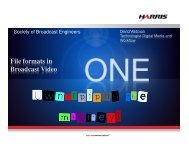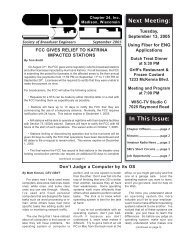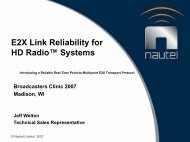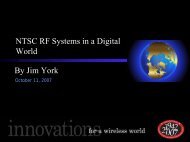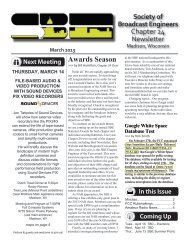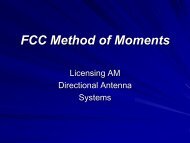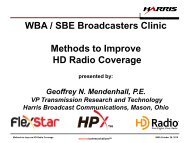Broadcasters Clinic - SBE Chapter 24
Broadcasters Clinic - SBE Chapter 24
Broadcasters Clinic - SBE Chapter 24
Create successful ePaper yourself
Turn your PDF publications into a flip-book with our unique Google optimized e-Paper software.
2009<br />
<strong>Broadcasters</strong> <strong>Clinic</strong><br />
And<br />
Society of Broadcast Engineers<br />
Upper Midwest Regional Meeting<br />
October 13-15, 2009<br />
Madison Marriott West
BROADCASTERS CLINIC 2009<br />
Program Agenda<br />
Tuesday, October 13<br />
7:45 am - Registration & Continental Breakfast<br />
9:00 am - FM HD Transmitter Boost<br />
Speaker: Jeff Welton, Nautel<br />
Moderator: Greg Dahl, Second Opinion Communications<br />
In light of the recent<br />
comment period<br />
opened by the FCC,<br />
with subsequent<br />
comments by NPR,<br />
iBiquity, broadcasters<br />
and manufacturers,<br />
attention is being turned to what is involved with increasing<br />
HD injection levels. Until recently, the answer has been<br />
universally, “you must buy a bigger transmitter”. However,<br />
recent developments indicate that this may not be the only<br />
option. Jeff Welton will discuss these developments, as<br />
well as covering points to consider when determining what<br />
might be the best solution for your particular situation.<br />
9:45 am - Next Generation IP-based Audio<br />
Speaker: Frank Grundstein, Logitek<br />
Moderator: Jason Mielke, WCLO/WJVL<br />
Networked audio<br />
consoles have a poor<br />
record of interoperability.<br />
Even if models<br />
have the ability to communicate,<br />
the complex<br />
setup and varying<br />
parameter choices by manufacturers effectively isolate one<br />
model of equipment from another. This is reminiscent of<br />
the early days of networking in the computer industry.<br />
Recently available protocols allow multicasting systems,<br />
like digital mixers, to automatically find and select the many<br />
settings required for network communication to work.<br />
Consoles can now find other audio equipment, negotiate<br />
communication methods and receive a list of available<br />
sources just by turning on the power. Some user groups<br />
have started requiring a minimum set of protocols in the networked<br />
equipment they buy. This growing demand by users<br />
will speed the adoption of standards by manufacturers and<br />
make it possible for consoles from a variety of manufacturers<br />
to send and receive audio with little or no user involvement<br />
either across the room or around the world.<br />
10:30 am - Break<br />
Sponsored By: RCS<br />
10:45 am - Fixing Delay Variations in IBOC Audio<br />
Speaker: Dave Hershberger, Continental Electronics<br />
Moderator: Clif Groth<br />
Audio delay<br />
variations in IBOC<br />
systems can be a<br />
real annoyance. Even<br />
if you set the audio<br />
delay accurately, it<br />
may drift or jump to a different value, creating an<br />
audible echo when receivers blend between digital and<br />
analog. The delay variations are often caused by<br />
changes in network latency or lost packets.The causes<br />
of delay variation are discussed along with a<br />
combination of technologies which can fix the problem.<br />
11:30 am - IP High-Tech Delivery Advances<br />
Speaker: Kevin Webb, Tieline<br />
Moderator: Greg Dahl, Second Opinion Communications<br />
IP High-Tech Delivery<br />
Advances will show<br />
you how to transition<br />
from circuit switched<br />
POTS and ISDN<br />
audio delivery<br />
strategies to packet<br />
switched IP audio distribution and routing for remote<br />
broadcasts, audio distribution and studio to transmitter<br />
links. New skill sets and approaches are required by<br />
broadcast engineers to transition into audio over IP. Find<br />
out what’s changed and how to go forward in the new<br />
world of IP. Kevin Webb has 20 years experience in<br />
broadcast engineering and has advised most of the top<br />
40 Radio networks across America on strategies for<br />
transitioning into IP.<br />
12:15 pm - Lunch<br />
Sponsored By: Ross Video<br />
2:00 pm - CLEANER…Yet Still Loud!<br />
Speaker: Frank Foti, Telos<br />
Moderator: Gordon Carter, WFMT Radio<br />
Broadcast audio<br />
processing for<br />
conventional<br />
transmission (FM<br />
and AM) has<br />
reached extreme<br />
levels. Most<br />
methods available<br />
today are capable of creating LOUD competitive<br />
signals, usually at the noticeable and perceptible<br />
expense of quality. What can be done…again…to<br />
raise the bar?<br />
Through critical listening, extensive research, and<br />
evaluation of processing methods, it was determined<br />
the single most annoying quotient is due to intermodulation<br />
distortion (IMD) induced by the aggressive<br />
functions within the processing system. The algorithms<br />
themselves are being pushed to the limits, and possibly<br />
beyond.<br />
Through discussion, and sonic demonstration,<br />
the problem will be illustrated. More importantly, a<br />
new method for competitive audio processing will be<br />
revealed which eliminates the challenges suffered by<br />
current processing methods. Audio demonstrations will<br />
be used to provides A/B comparisons of the present<br />
and new method.
Additionally, it will be discussed how this method can<br />
be used for other processing applications in addition to<br />
conventional FM and AM broadcasting.<br />
2:45 pm - FM Antennas 101.1<br />
Speaker: Bob Surette, Shively<br />
Moderator: Gary Mach<br />
While there has been<br />
a host of technology<br />
changes over the<br />
years when it comes<br />
to FM RF transmission<br />
systems there is<br />
a need for a good<br />
understanding of<br />
basic filter and antenna theory starting with isotropic<br />
‘perfect’ sources. My presentation will take the audience<br />
through how energy is radiated from a single source and<br />
how multiple sources can be connected together to form<br />
a simple antenna array.<br />
I will show by examples how familiar parameters such<br />
as beam tilt and null-fill are realized within a practical<br />
array by varying the amplitudes and phases of the feeds<br />
to each source. Expanding the discussion to the differences<br />
between isotropic sources and real antennas Bob<br />
will explain by example how various methods commonly<br />
used to reduce downward radiation are implemented<br />
within the practical antenna array.<br />
3:30 pm - Break<br />
Sponsored By: RCS<br />
3:45 pm - AM Method of Moments<br />
Speaker: George Werl, Commsulting, Inc<br />
Moderator: Steve Brown, Radio Rangers<br />
“The FCC recently<br />
adopted rules<br />
allowing AM stations<br />
with directional<br />
antennas to certify<br />
and maintain<br />
directional system<br />
parameters with a new methodology called Method of<br />
Moments. This paper will compare and contrast the<br />
traditional field measurement approach with the new<br />
Method of Moments methodology and discuss what is<br />
necessary to implement Method of Moments in new<br />
and existing directional antenna systems.”<br />
4:30 pm - <strong>Broadcasters</strong> <strong>Clinic</strong><br />
Exhibits Open/Reception<br />
Sponsored By: WBA<br />
7:30 pm - <strong>Broadcasters</strong> <strong>Clinic</strong> Nuts & Bolts,<br />
Panel Discussion lead by:<br />
Speaker: Bob Surette, Shively<br />
Moderator: Bill Hubbard, UW-Green Bay<br />
Moderator: Gary Mach<br />
Wednesday, October 14<br />
7:45 am - Registration &<br />
Continental Breakfast<br />
Sponsored By: Nautel Limited<br />
8:30 am - Tower Grounding<br />
Speaker: Jeff Welton, Nautel<br />
Moderator: Gary Mach<br />
FLASH….CRASH…..WE’RE OFF THE AIR!<br />
Jeff Welton discusses<br />
lightning prevention<br />
and things you can do<br />
to protect the facility –<br />
the discussion will<br />
involve basic<br />
techniques to ensure<br />
good lightning protection practices are being followed so<br />
that you can maximize revenue potential by minimizing<br />
down time. These days with solid state transmitters and<br />
computers everywhere in the studio and transmitter site,<br />
proper grounding and lightning protection practices are<br />
essential to ensure continuous operation of your station.<br />
We will explore various aspects of facility protection, with<br />
any eye toward cost effective damage prevention.<br />
9:15 am - Basics of the Smith Chart<br />
Speaker: Jeremy Ruck, D.L. Markley & Associates<br />
Moderator: Greg Dahl, Second Opinion Communications<br />
For many engineers<br />
the Smith Chart is a<br />
mystery, but it doesn’t<br />
need to be. In this<br />
presentation we will<br />
examine some of the<br />
fundamental concepts<br />
that led to the development of the Smith Chart. The<br />
historical derivation of the chart will be briefly discussed,<br />
with practical examples of how the chart may be used in<br />
the broadcast environment.<br />
10:00 am - Exclusive Exhibit Time<br />
11:00 am - Lunch (Ticket required)<br />
Sponsored By: Comrex Corporation<br />
1:30 pm - Implications of Man Made Noise<br />
Speaker: Chuck Kelly, Nautel<br />
Moderator: Keith Kintner, UW-Oshkosh<br />
In the last decade,<br />
noise floor levels have<br />
risen due a dramatic<br />
increase in high<br />
frequency devices in<br />
the home, workplace<br />
and car. This paper<br />
will examine available<br />
data about current noise levels, both theoretical and<br />
anecdotal, and describe possible efforts that broadcasters<br />
can make to maintain their coverage area.
2:15 pm - Update on EAS CAP<br />
Speaker: Gary Timm, Journal Broadcast Group<br />
Moderator: Kent Aschenbrenner, Milwaukee Public TV<br />
The FCC and FEMA<br />
are moving forward<br />
with plans to<br />
modernize the<br />
Emergency Alert<br />
System (EAS)<br />
through the adoption<br />
of CAP, the Common<br />
Alerting Protocol. What is CAP, and why do we need<br />
it? Where are we in this process, and what is the<br />
status of the infamous “180-day clock”? Gary Timm,<br />
Broadcast Chair of our Wisconsin EAS Committee, is<br />
involved with numerous working groups and<br />
committees dealing with the many phases of this<br />
historic transition and will bring us up to date on the<br />
current status of this revolution in emergency alerting.<br />
3:00 pm - Break<br />
Sponsored By: RCS<br />
3:15 pm - Reception on the Fringe<br />
Speaker: Stan Winrich, Digital Pro<br />
Moderator: Leonard Charles, WISC-TV<br />
In the last couple of<br />
years I have done<br />
extensive testing in<br />
fringe to extreme<br />
fringe area television<br />
antenna installations<br />
and reception issues<br />
for UHF and high<br />
band VHF digital signals in central WI, after dozens of<br />
installations I have come up with the proper<br />
combination of antenna’s and amplifiers for most<br />
terrains. I have earned a reputation as the go to guy<br />
for difficult fringe installations and receive referrals<br />
from the local TV and appliance store and from<br />
engineers, I will share what works and what does not<br />
work and answer questions to help clear up some of<br />
the misinformation that is out there.<br />
4:00 pm - 10Gigabit Cable for Audio and Video<br />
Applications<br />
Speaker: Steve Lampen, Belden<br />
Moderator: Gary Mach<br />
The hottest new thing<br />
in data is 10gig,<br />
10GbaseT, and it will<br />
be sweeping into<br />
audio, video and<br />
broadcast applications<br />
soon. This<br />
presentation shows what it is, how it works, and why<br />
previous cable designs don’t work.<br />
Connectors, patch panels, and patch cords are also<br />
critical and are included. This presentation starts with<br />
the history of EthernetR and twisted pairs for data.<br />
5:30 pm - Dinner<br />
7:00 pm - <strong>SBE</strong> Meeting - Cart Machine Anniversary<br />
Speaker: Andy Rector, ACC Electronix<br />
The broadcast cartridge machine was<br />
introduced at the NAB Convention in<br />
1959 by Collins Radio and Automatic<br />
Tape Control. This machine had a<br />
profound impact on broadcasting in<br />
general and “top forty” radio specifically<br />
over the following forty years. Some<br />
old timers from ATC will be at the Madison <strong>Broadcasters</strong><br />
<strong>Clinic</strong> to recall the history of the broadcast cartridge<br />
machine via a PowerPoint Presentation spiced with some<br />
memorable cart machine stories. There will also be an<br />
exhibit in the <strong>SBE</strong> booth of some of the cart machines<br />
that evolved during the last 50 years.<br />
Alpha & Omega? Just about. One is an endless loop tape<br />
player (manufactured by Moulic Specialties of Bloomington,<br />
Illinois) The other is an ITC Series 99 Recorder/Reproducer<br />
thought by many to be the ultimate broadcast cart machine.<br />
Thursday, October 15<br />
7:45 am - Registration & Continental Breakfast<br />
8:30 am - Understanding Reliability in Mobile TV<br />
Speaker: John Schadler, Dielectric Communications<br />
Moderator: Kevin Ruppert, WISC-TV<br />
Reliability is the key to<br />
the success of Mobile<br />
TV. Service reliability<br />
depends on the spatial<br />
immunity of the<br />
handheld receiver.<br />
Spatial immunity can<br />
only be achieved with<br />
sufficient margin in the received signal strength. Over the<br />
last 18 months, Dielectric has presented experimental<br />
results showing transmission of circularly polarization to a<br />
linearly polarized receiver provides approximately 5 dB of<br />
margin improvement over horizontal and vertical<br />
transmission in a depolarized fading environment. These<br />
tests were performed in a controlled environment; but what<br />
about the real world? New tests compare real world test<br />
data with our initial conclusions and answer questions<br />
about the choice of circular polarization for Mobile TV and<br />
its link to reliable service.<br />
9:15 am - Video (AFD) & Audio Metadata<br />
Speaker: Randy Conrod, Harris Corporation<br />
Moderator: Leonard Charles, WISC-TV<br />
Utilizing metadata for<br />
audio and video<br />
essence enhanced<br />
processing is one of the<br />
key aspects for<br />
designing today’s<br />
systems. This paper is<br />
a discussion of what is possible, what works well and what<br />
doesn’t work so well. Examples for audio metadata<br />
applications and AFD for aspect ratio signaling will be given.
10:00 am - Break<br />
Sponsored By: RCS<br />
10:15 am - Mobile TV Field Tests<br />
Speaker: Victor Tawil, MSTV<br />
Moderator: Leonard Charles. WISC-TV<br />
MSTV has been<br />
involved in field testing<br />
the ATSC Mobile TV<br />
system for standards<br />
verification. This<br />
presentation will go<br />
over the results of<br />
those field tests held in various cities around the country.<br />
11:00 am - Lip Sync and ATSC Update<br />
Speaker: Adam Goldberg, AGP, LLC<br />
Moderator: Leonard Charles, WISC-TV<br />
A technical discussion<br />
of contemporary<br />
digital television<br />
implementation issues<br />
and future enhancements.<br />
The presenter<br />
will include<br />
discussions on audiovideo<br />
synchronization problems and solutions, audio<br />
loudness issues and possible solutions, from both<br />
emission and reception perspectives, as well as a brief<br />
discussion of future ATSC enhancements.<br />
Noon - Lunch<br />
Sponsored by: WBA<br />
1:15 pm - Implementing Mobile/Handheld<br />
Speaker: Jay Adrick. Harris Corporation<br />
Moderator: Mark Burg, WLAX-TV<br />
This program will<br />
include an update on<br />
the standardization<br />
process, an overview<br />
of the ATSC Mobile<br />
DTV technology and a<br />
review of the planned<br />
activities that will lead<br />
up to commercialization of this exciting new technology.<br />
There will also be a complete discussion of the systems<br />
and equipment required at the digital television station in<br />
order to implement mobile service. The presentation will<br />
also look at prototype receiving equipment that will be<br />
soon be available in the consumer market place.<br />
2:00 pm - Display Technology<br />
Speaker: Jim Noecker, Panasonic<br />
Moderator: Bill Hubbard, UW-Green Bay<br />
•A brief history of how<br />
reference monitor<br />
technology has<br />
evolved from the<br />
mainstay of CRTs to<br />
today’s PDP, LCD and<br />
other emerging<br />
technology candidates<br />
• Plasma fundamentals – How does it work?<br />
• Comparison of Panasonic Professional to Consumer<br />
plasmas<br />
• Comparisons of PDP to LCD for Reference Monitoring<br />
applications<br />
•Key attributes of plasma for studio and post-house<br />
applications<br />
2:45 pm - Repurposing Content for Web and<br />
Mobile<br />
Speaker: Scott Matics, Thomson Grass Valley<br />
Moderator: Keith Kintner, UW-Oshkosh<br />
Few will argue that<br />
the way we<br />
produce, and<br />
distribute television<br />
content has<br />
changed dramatically<br />
in the last<br />
several years. At<br />
no time in the history of the industry have a<br />
collection of technological, market, and economic<br />
forces converged to alter the business of broadcast.<br />
This session will present an analysis of the<br />
technical options available to broadcasters today to<br />
make the process of repurposing content more<br />
efficient, productive, and simultaneously drive the<br />
creation of “better” content, as far as its ability to be<br />
indexed, discovered, and viewed on multiple<br />
devices.<br />
Many broadcasters today utilize primitive repurposing<br />
tools and a linear, manual process to take their overthe-air<br />
content to the web and mobile platforms. Recent<br />
advancements in automation make it possible to significantly<br />
improve these workflows, resulting in repurposed<br />
content that is easier to create, and gets to multiple<br />
distribution points within minutes (it is News content after<br />
all!).<br />
Join us next year for the<br />
<strong>Broadcasters</strong> <strong>Clinic</strong><br />
October 12-14, 2010
Sponsors<br />
Comrex - Wednesday Lunch Sponsor<br />
RCS - Tuesday, Wednesdy and Thursday Break<br />
Sponsor<br />
Full Compass - Audio Equipment<br />
Ross Video - Tuesday Lunch Sponsor<br />
Nautel - Program, Wednesday’s Continental<br />
Breakfast Sponsor<br />
Sony - Projector<br />
Wisconsin <strong>Broadcasters</strong> Association<br />
Exhibitor Reception and Thursday Lunch Sponsor<br />
Thank You’s . . .<br />
Cover Photo Credits:<br />
Terry Baun, CPBE and CBNT<br />
Educational Communication Board<br />
Radio World<br />
Broadcast Enginnering magazine<br />
iStockphoto/Stephen Morris<br />
Leonard Charles<br />
CPBE WISC-TV<br />
iStockphoto/Richard Beebe<br />
Doug Garlinger<br />
CPBE 8VSB CBNT<br />
IStockphoto/Imagestory<br />
Speakers “Thank You” for your expertise<br />
WBA Board of Directors<br />
Michelle Vetterkind, CAE, President of WBA<br />
Mandy Endicott, WBA Administrative Assistant<br />
<strong>Broadcasters</strong> <strong>Clinic</strong> Program Committee
2009 Program Committee<br />
Leonard Charles, Chair - Television Wisconsin, Inc., Madison, WI<br />
Kent Aschenbrenner - Milwaukee Public Television, Milwaukee, WI<br />
Don Borchert - Sun Prairie, WI<br />
Stephen Brown - Radio Rangers, LLC, Minneapolis, MN<br />
Mark Burg - WLAX-TV, La Crosse, WI<br />
Gordon Carter - WFMT Radio, Chicago, IL<br />
Greg Dahl - Second Opinion Communications, Inc., Rockford, IL<br />
Clif Groth - Watertown, WI<br />
Bill Hubbard - UW-Green Bay, Green Bay, WI<br />
Vern Killion - Johnson Lake, NE<br />
Keith Kintner - UW-Oshkosh, Oshkosh, WI<br />
Vicki Kipp - Educational Communications Board, Madison, WI<br />
Gary Mach - Green Bay, WI<br />
Jason Mielke - WCLO/WJVL, Janesville, WI<br />
Kevin Ruppert - WISC-TV, Madison, WI<br />
Tom Smith - WHA-TV, Madison, WI<br />
Linda Baun - Wisconsin <strong>Broadcasters</strong> Association, Madison, WI<br />
EXHIBITORS<br />
The <strong>Broadcasters</strong> <strong>Clinic</strong> Committee and the Wisconsin <strong>Broadcasters</strong> Association<br />
wishes to extend our gratitude to: The Broadcast <strong>Clinic</strong> Exhibitors and The Prize Donors<br />
Alpha Video & Audio, Inc.<br />
Avid Technology Inc.<br />
Axcera<br />
Broadcast Electronics<br />
<strong>Broadcasters</strong> General Store<br />
Canon U.S.A.<br />
Comrex<br />
Continental Electronics<br />
Corporation<br />
Dielectric Communications<br />
ENCO Systems<br />
ERI<br />
Evans Associates<br />
EVERTZ<br />
GEPCO International<br />
Gorman Redlich MFG. CO.<br />
Grass Valley<br />
Harris<br />
Hitachi Kokusai Electric America,<br />
LTD<br />
Joseph Electronics<br />
Linear Industries<br />
Logitek Electronic Systems<br />
Midwest Media Group<br />
Miranda Technologies<br />
Nautel Limited<br />
Omneon<br />
RAM Broadcast Systems<br />
RCS<br />
Resonant Results<br />
Ross Video<br />
SCMS<br />
SONY<br />
STAINLESS LLC<br />
Vislink News &<br />
Entertainment<br />
Wave Communications<br />
Wisconsin <strong>SBE</strong> <strong>Chapter</strong><br />
(List is inconclusive. See Exhibitors Map in your Attendance Packet for complete listing.)
BROADCASTERS CLINIC 2009 REGISTRATION FORM<br />
October 13-15, 2009<br />
I will attend: (Please check) Tuesday Wednesday Thursday<br />
Fees: $130 (Any two days) $150 (All three days)<br />
Please Fill Out Completely<br />
Name:__________________________________________________________<br />
Organization/Station:_______________________________________________<br />
Business Address_________________________________________________________________________<br />
street city state/zip<br />
Phone:______________________________ Email_______________________<br />
daytime number/evening number<br />
Amount enclosed: $ _______________<br />
Mail this form and your check by September <strong>24</strong>, 2009 made payable to <strong>Broadcasters</strong> <strong>Clinic</strong>:<br />
DATES<br />
Tuesday through Thursday, October 13-15, 2009<br />
LOCATION & Accommodations:<br />
All sessions of the <strong>Broadcasters</strong> <strong>Clinic</strong> 2009 are<br />
held at the Madison Marriott-West, located at 1313<br />
John Q. Hammons Drive, Middleton. Please make<br />
your own room reservations with the Marriott-West.<br />
The hotel telephone number is 608-831-2000. We<br />
suggest that you make your reservations before<br />
September 18, 2009, while discounted rooms are<br />
being held for the seminar. The discount rate is<br />
$114. Please specify that you are attending the<br />
<strong>Broadcasters</strong> <strong>Clinic</strong> 2009.<br />
To pay by credit card please complete the following:<br />
Name on Card:_________________________________________ Daytime Phone___________________________<br />
Billing Address (Billing City, State, Zip):________________________________________________________________<br />
_______________________________________________________________________________________________<br />
Credit Card Number___________________________ Type of Card: VISA MasterCard Expires:_____________<br />
Signature Required: __________________________________<br />
Linda Baun<br />
WBA<br />
44 E. Mifflin Street Ste. 900<br />
Madison, WI 53703<br />
To register by phone,<br />
please call 1-800-236-1922 or<br />
fax to 608-256-3986<br />
or register at www.wi-broadcasters.org<br />
GENERAL INFORMATION<br />
d’oeuvres (cash bar). Vegetarian meals can be<br />
requested by calling the WBA office at 1-800-236-<br />
1922, by September <strong>24</strong>, 2009.<br />
The WBA will need to guarantee meal counts<br />
with the hotel, therefore the WBA will NOT refund<br />
any cancellations made after September 21, 2009.<br />
The WBA will also invoice for all “no-shows.”<br />
INFORMATION<br />
For further conference or exhibitor information,<br />
contact: Linda Baun, Phone: 800-236-1922,<br />
lbaun@wi-broadcasters.org<br />
FEE<br />
$130 - Any two days $150 - All three days<br />
Fee covers program materials, continental breakfasts<br />
and luncheons as indicated, refreshment<br />
breaks, and an evening reception with hot hors<br />
REGISTRATION<br />
To register by phone, please call 1-800-236-1922<br />
or fax to 608-256-3986 to register online at<br />
www.wi-broadcasters.org



